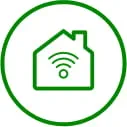In the fast-paced world we live in, a reliable and speedy internet connection is not just a luxury— it's a necessity. If you regularly find yourself frustrated with downloads that seemingly take forever, endless buffering and connections that are anything but reliable, it might be time to consider making the switch to a new internet provider. And when it comes to choosing the best type of internet service, fiber internet stands alone.
Why switch internet providers at all?
First things first, let's address the elephant in the room: the overall hassle of switching internet providers. To say that switching internet providers can be a bit of a headache is an understatement. From navigating through a maze of customer service representatives to the logistical nightmare of coordinating installation dates, the prospect of change may not seem all that appealing. However, the potential benefits of switching internet providers far outweigh the temporary inconveniences you might experience during the switch.
Over time, your internet needs evolve, and if your current provider isn't keeping up with the times or providing you with less-than-stellar customer service, you might be missing out on the full potential of what modern technology has to offer. Faster speeds, lower latency and increased bandwidth are just a few of the perks that come with upgrading to a superior internet service — perks brought to you by the remarkable capabilities of fiber internet.
Fiber vs. cable internet: how do I decide?
What makes fiber internet so unique?
Why exactly are so many people choosing to upgrade to fiber internet? Here are just some of the top reasons:
1. In a word, speed
Fiber internet’s signature attribute — and the primary reason why so many people are choosing to make the switch to it — is that fiber internet is incredibly fast. Fiber optic cables transmit data using light signals, resulting in speeds that leave traditional copper cables in the dust. Whether you're streaming 4K videos, engaging in high-intensity online gaming or working from home with multiple connected devices, fiber internet ensures a smooth, lightning-fast experience.
Why streaming is better than cable
2. Neither rain, nor sleet, nor snow
Unlike its copper-based counterparts, which seem to break down at the slightest hint of inclement weather, fiber internet is not susceptible to environmental interference, like rain, snow or thunderstorms. This robustness translates to a more reliable and consistent connection, ensuring that your internet doesn't abandon you in the middle of that crucial Zoom meeting, online school lesson or Netflix binge.
3. Symmetrical speeds
One of the lesser-known advantages of fiber internet — but incredibly important — is its symmetrical speed. Unlike other types of connections where upload speeds lag behind download speeds, fiber internet provides equal speeds in both directions. This is a game-changer for those who regularly upload large files or engage in video conferencing, making collaboration and content creation simple and seamless.
4. Enhanced security
Fiber optic cables are not susceptible to electromagnetic interference, a vulnerability that has always plagued traditional copper cables. This inherent security feature makes fiber internet less vulnerable to cyber threats and helps to ensure a more secure online experience.
5. Future-proof investment
As technology advances, the demand for faster internet only grows. Fiber optic infrastructure is future-proof, capable of handling the increasing data demands of tomorrow and well beyond. By making the switch to fiber internet now, you're not just investing in a faster, more reliable internet connection today, but ensuring your connection remains cutting-edge in the years to come.
Navigating the switch
While switching providers may not be a walk in the park, there are steps you can take to make the transition to a new internet provider smoother:
1. Do your research
Take the time to research different fiber internet providers in your area. Read customer reviews, compare pricing plans and inquire about installation timelines. Knowledge is your best ally in making an informed decision.
2. Plan for some downtime
Unfortunately, a brief interruption in your internet service is inevitable when switching providers. Plan for it by notifying colleagues, scheduling important online activities accordingly and having alternative connectivity options available if needed — maybe that new coffee shop you’ve been meaning to check out?
3. Ask lots of questions
Don't hesitate to ask potential providers about their installation process, customer support and any potential challenges you might face. And if they seem reluctant to provide answers or you’re just not comfortable with their responses, don’t be afraid to move on and try another provider. The more information you have, the better prepared you'll be. And don’t forget to ask about new customer promotions or discounts.
4. Review contract terms and exit fees
Before changing internet providers, review your current provider's contract terms. Some providers impose exit fees for early termination. Knowing these details in advance helps you plan your switch more strategically and avoid unnecessary costs. It also allows you to time your switch to align with the end of your current contract, minimizing potential penalties.
The decision to switch internet providers, particularly to embrace fiber internet, is an investment in a faster, more reliable and future-proof online experience. While the process may pose its challenges, the long-term benefits far outweigh the temporary inconveniences. So, if you're ready to unleash the true potential of your internet connection, the path forward is clear: fiber internet is the future. Ziply Fiber offers fast, reliable, affordable plans designed with Northwest customers in mind.






